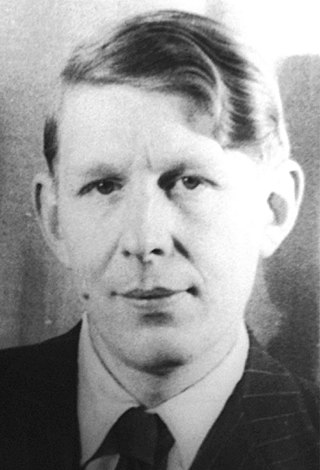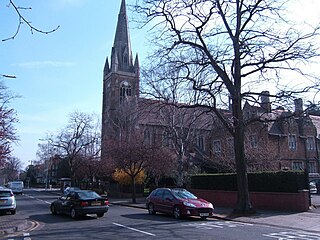
Wystan Hugh Auden was a British-American poet. Auden's poetry is noted for its stylistic and technical achievement, its engagement with politics, morals, love, and religion, and its variety in tone, form, and content. Some of his best known poems are about love, such as "Funeral Blues"; on political and social themes, such as "September 1, 1939" and "The Shield of Achilles"; on cultural and psychological themes, such as The Age of Anxiety; and on religious themes, such as "For the Time Being" and "Horae Canonicae".

Edward Benjamin Britten, Baron Britten was an English composer, conductor, and pianist. He was a central figure of 20th-century British music, with a range of works including opera, other vocal music, orchestral and chamber pieces. His best-known works include the opera Peter Grimes (1945), the War Requiem (1962) and the orchestral showpiece The Young Person's Guide to the Orchestra (1945).

Christopher William Bradshaw Isherwood was an Anglo-American novelist, playwright, screenwriter, autobiographer, and diarist. His best-known works include Goodbye to Berlin (1939), a semi-autobiographical novel which inspired the musical Cabaret (1966); A Single Man (1964), adapted as a film by Tom Ford in 2009; and Christopher and His Kind (1976), a memoir which "carried him into the heart of the Gay Liberation movement".

Humphrey William Bouverie Carpenter was an English biographer, writer, and radio broadcaster. He is known especially for his biographies of J. R. R. Tolkien and other members of the literary society the Inklings.
Antoinette Millicent Hedley Anderson was an English singer and actor.

Noye's Fludde is a one-act opera by the British composer Benjamin Britten, intended primarily for amateur performers, particularly children. First performed on 18 June 1958 at that year's Aldeburgh Festival, it is based on the 15th-century Chester "mystery" or "miracle" play which recounts the Old Testament story of Noah's Ark. Britten specified that the opera should be staged in churches or large halls, not in a theatre.
Boosey & Hawkes is a British music publisher, purported to be the largest specialist classical music publisher in the world. Until 2003, it was also a major manufacturer of brass, string and woodwind musical instruments.

Hymn to St Cecilia, Op. 27 is a choral piece by Benjamin Britten (1913–1976), a setting of a poem by W. H. Auden written between 1940 and 1942. Auden's original title was "Three Songs for St. Cecilia's Day", and he later published the poem as "Anthem for St. Cecilia’s Day ".
"Funeral Blues", or "Stop all the clocks", is a poem by W. H. Auden which first appeared in the 1936 play The Ascent of F6. Auden substantially rewrote the poem several years later as a cabaret song for the singer Hedli Anderson. Both versions were set to music by the composer Benjamin Britten. The second version was first published in 1938 and was titled "Funeral Blues" in Auden's 1940 Another Time. The poem experienced renewed popularity after being read in the film Four Weddings and a Funeral (1994), which also led to increased attention on Auden's other work. It has since been cited as one of the most popular modern poems in the United Kingdom.

Rejoice in the Lamb is a cantata for four soloists, SATB choir and organ composed by Benjamin Britten in 1943 and uses text from the poem Jubilate Agno by Christopher Smart (1722–1771). The poem, written while Smart was in an asylum, depicts idiosyncratic praise and worship of God by different things including animals, letters of the alphabet and musical instruments. Britten was introduced to the poem by W. H. Auden whilst visiting the United States, selecting 48 lines of the poem to set to music with the assistance of Edward Sackville-West. The cantata was commissioned by the Reverend Walter Hussey for the celebration of the 50th anniversary of the consecration of St Matthew's Church, Northampton. Critics praised the work for its uniqueness and creative handling of the text. Rejoice in the Lamb has been arranged for chorus, solos and orchestral accompaniment, and for SSAA choir and organ.
The Group Theatre (London) was an experimental theatre company founded in 1932 by Rupert Doone and Robert Medley. It evolved from a play-reading group in Cambridge that Doone had been involved with during his years studying with the Cambridge Festival Theatre. The Group Theatre was active from 1932 to 1939 and reformed as The Group Theatre Ltd. in the early 1950s.
John Bicknell Auden was an English geologist and explorer, older brother of the poet W. H. Auden, who worked for many years in India with the Geological Survey of India and later with the Food and Agriculture Organization. He studied the Himalayan strata, particularly the Krol Belt where he recognized rocks from the Peninsula thrusting north into the Himalayas. He also studied groundwater and was involved in studying the geology of many dam sites in India. Auden's Col is named after him.

On the Frontier: A Melodrama in Three Acts, by W. H. Auden and Christopher Isherwood, was the third and last play in the Auden-Isherwood collaboration, first published in 1938.
Donald Charles Peter Mitchell CBE was a British writer on music, particularly known for his books on Gustav Mahler and Benjamin Britten and for the book The Language of Modern Music, published in 1963.
This is a bibliography of books, plays, films, and libretti written, edited, or translated by the Anglo-American poet W. H. Auden (1907–1973). See the main entry for a list of biographical and critical studies and external links. Dates are dates of publication of performance, not of composition.
The Habit of Art is a 2009 play by English playwright Alan Bennett, centred on a fictional meeting between W. H. Auden and Benjamin Britten while Britten is composing the opera Death in Venice. It premiered on 5 November 2009 at the Lyttelton Theatre at the Royal National Theatre, with the central roles filled by Alex Jennings as Britten and Richard Griffiths as Auden. The performance of April 22, 2010 was broadcast to more than 200 cinemas worldwide by NTLive.
A Charm of Lullabies, Op.41 is a song cycle for mezzo-soprano with piano accompaniment by Benjamin Britten. It consists of five songs composed on poems by William Blake, Robert Burns, Robert Greene, Thomas Randolph and John Phillip. It was written in 1947 for Nancy Evans, who gave the first performance with Felix de Nobel (piano) at a festival in The Hague 3 January 1948. The score was first published in 1949 by Boosey and Hawkes in London.
Benjamin Britten's Sinfonietta was composed in 1932, at the age of 18, while he was a student at the Royal College of Music. It was first performed in 1933 at The Ballet Club, London conducted by Iris Lemare. It was published as his Op. 1 and dedicated to his teacher Frank Bridge.

Soirées musicales,, Op. 9, is a suite of five movements by Benjamin Britten, using music composed by Gioachino Rossini. The suite, first performed in 1937, derives its title from Rossini's collection of the same name, dating from the early 1830s, from which Britten drew much of the thematic material.









